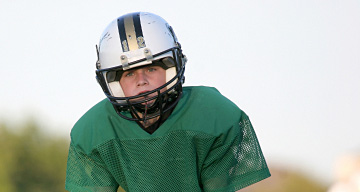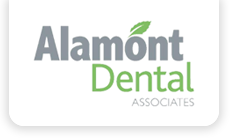Emergency Dental Care for Bristol, Virginia, Bristol, Tennesee, and More
If you are having a dental emergency, please call us immediately at (423) 968-4422.
The best way to prevent a dental emergency is to properly protect your teeth. Alamont Dental Associates recommend that children and adults engaged in sports or recreational activities wear mouth guards. Mouth guards are recommended for all athletic sports, as well as, rollerblading, skating, and bicycling. Most mouth guards are made of plastic and cover the upper and lower teeth. Not only do mouth guards protect teeth but they also protect lips, gums, and cheeks.
 Commonly there are two types of mouth guards: semi-formable and dentist made custom mouth guards.
Commonly there are two types of mouth guards: semi-formable and dentist made custom mouth guards.
- Semi-formable mouth guards are available in sporting good stores and in drug stores. Often these mouth guards can be boiled to fit allowing them to sit snugly against the teeth.
- Dentist made custom mouth guards are ideal for sports where contact is likely. The dentist creates a mold of the mouth which is used to create the mouth guard. Consequently, these mouth guards fit more securely against the teeth affording the best protection.
One of the most important things you can do to protect your teeth is to make sure that you are prepared before an accident even occurs. Our office hours usually extend into the evening time, meaning that a dentist is available to take care of dental emergencies if they arise. Keep our phone number readily available (carry it in your wallet or organizer, for example).
Accidents do happen, and knowing what to do when one occurs can mean the difference between saving and losing a tooth. The most common dental emergencies include (1) teeth that have been knocked out due to trauma and (2) teeth that have been chipped as a result of an accident.
Knocked Out Tooth:
Time is the enemy when a tooth is knocked out. If a dentist is seen within one hour after an accident, chances are good that the tooth can be re-implanted and saved.
Hold the tooth by the crown and rinse off the root of the tooth in water if it’s dirty. Do not scrub it or remove any attached tissue fragments. Make sure that you do not touch the root of the tooth with your hands. The root is the portion of the tooth embedded in the gum and not normally seen.
If possible, gently insert and hold the tooth in its socket or with a wet wrap. If that isn’t possible or you are afraid of swallowing the tooth, put the tooth in a cup of milk or saliva and call us as quickly as possible. Remember to take the tooth with you.
Broken or Chipped Teeth:
With chipped teeth the situation is slightly more complicated. If you are experiencing pain or sensitivity in the affected tooth, call us immediately as this indicates the tooth nerve may be injured. Rinse your mouth with warm water to clean the area. Use cold compresses on the area to keep any swelling down.
If no pain or sensitivity is experienced, the situation is not as critical. You should call your dentist to double check, but in most cases, you can simply schedule a future appointment to replace the lost portion of the tooth with a porcelain veneer or with bonding material.
Jaw-Possibly Broken:
Do not move the injured jaw, secure into place with a scarf or bandage. Apply cold compresses to control swelling. Go to the hospital emergency department immediately.
Bitten Lip or Tongue:
Clean the area gently with a cloth and apply cold compresses to reduce any swelling. If the bleeding doesn’t stop, call us or go to a hospital emergency room immediately.
Objects Caught Between Teeth:
Try to gently remove the object with dental floss or an interdental cleaner; avoid cutting the gums. Never use a sharp instrument to remove any object that is stuck between your teeth. If you can’t dislodge the object using dental floss, contact us.
Toothache:
Rinse your mouth with warm water to clean it out. Gently use dental floss or an interdental cleaner to ensure that there is no food or other debris is caught between the teeth. Never put aspirin or any other painkiller against the gums near the aching tooth because it may burn the gum tissue. If the pain persists, contact us.
Canker Sores, Cold Sores and Fever Blisters:
For temporary pain relief, apply an over-the-counter cream/gel that has benzocaine. Benzocaine numbs the area. Follow the directions on the label. Avoid hot, spicy foods. A non-aspirin pill for children or ibuprofen pill for adults can be used to augment pain relief. Do not apply the pill directly to the sores. If sores do not heal within 7-14 days or signs of fever and/or pain persist, contact us immediately.
Pain From A New Tooth Appearing:
Find the site and apply a cold pack to the outside of the face. Non-aspirin, over-the-counter pain reliever can be swallowed. Do not apply pill directly on the gum. Follow the directions on medicine label. If pain continues, contact us.
